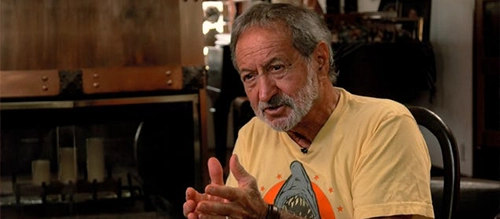Sharksploitation (2023) Review

Sharksploitation (2023)
Director: Stephen Scarlata
Screenwriters: Stephen Scarlata
Starring: Roger Corman, Joe Dante, Paul Bales, Joe Alves, Mark Atkins, Wendy Benchley
Sharksploitation is a documentary into the kind of film you know and love and hate, sometimes love to hate, sometimes hate to love, and didn’t think there needed to be a documentary for. Currently available to stream on Shudder, Sharksploitation is a love letter and exploration in the explosion of shark-related films of the past few decades. It delves into the origins of the finned fiend’s appearances on the big screen, charting through Jaws-mania and the ramifications for cinema before paying deep tribute to the schlocky CGI masterpieces such as Sharknado and Ghost Shark, staples of the diet of any awful B-movie aficionado of the 21st century.
No matter how much you think you know about shark movies, Sharksploitation shows that there is always something more to learn, another angle to put on it. With a good chunk of time spent at the beginning of the documentary looking at the portrayal of sharks before cinema, it sets up perhaps the most important aspect of the film: these are living creatures being depicted, incredible animals part of a very delicate ecosystem. Their presence is vital to the wellbeing of the oceans, to the beliefs of many cultures worldwide, and they should be treated with the respect and reverence they deserve.
Although Sharksploitation isn’t a nature documentary, and most of the film focuses on the evolution of sharks in film (having them as pets in James Bond as a dangerous threat even before Jaws, for example), there is a constant focus on the effects and ramifications that film and its representations of sharks can, and have, had. Interviews with Wendy Benchley (widow of Jaws creator Peter Benchley) adds nuance and a deeper perspective, as almost as much of the focus for her interviews is on the conservation work she has done in the decades after the film with her husband as it is on Jaws itself. Highlighting the mass shark hunts that were organised in the years after the explosion of shark films following Jaws, it is a sobering but vitally important demonstration of cinema’s power. Most of the films might be silly and have bad effects, but cinema’s power is to reach millions of people across the world, and whip up a conscious, or unconscious, cultural zeitgeist almost instantaneously. It has the power to change how we see the world, and we need to be wary of it at times.

Despite this, as the title suggests, it is also a pure love letter to the madness that the shark film subgenre has blossomed into. Rather than ridiculing films like Sharktopus and Ghost Shark, the film treats them as valued members of an ongoing tradition and legacy. It might poke fun at the ending to Jaws 3-D, but it still has its place, and is still worthy of study and recognition. Sharksploitation acknowledges films that might be far off blockbuster status as having skill and talent behind them; auteur direction or not, they are still cinema. It is a celebration of film in that it praises those who put years and years of labour and love and effort and work into making sheer joy and escapism.
Sharksploitation attacks from these two fronts. It is both a celebration of cinema, of passion and power, whilst highlighting real world issues that arise from it as a result. Of course, a documentary about films is always going to give the ardent cinephile a big list of films to add to their ‘to-watch’ list, but this is just the cherry on top. Sharksploitation takes a massive bite, and through sensitivity and knowledge, never bites off more than it can chew.
Score: 19/24
Recommended for you: Why Is It So Hard to Make a Good Shark Film?

